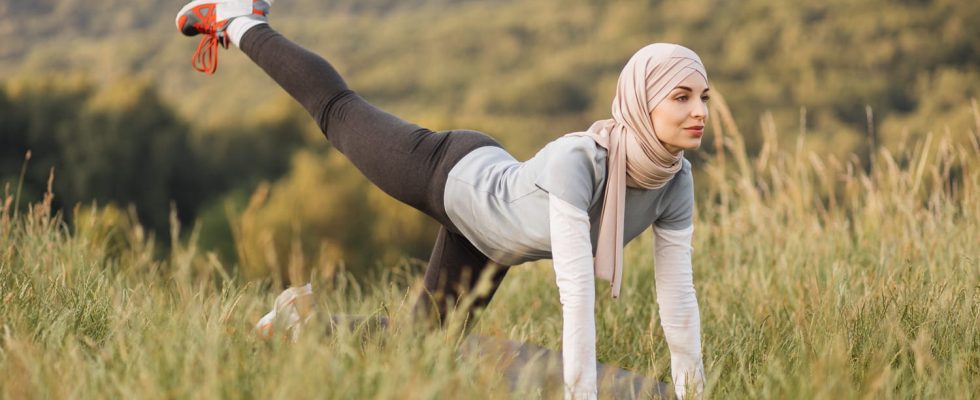Eating and drinking are among the prohibitions of the day during Ramadan. However, it is not impossible to continue to practice sport. Advice from our dieticians-nutritionists.
Every year for a month, practicing Muslims must respect certain rules among which do not drink or eat from sunrise to sunset. During this period of fasting, THE athletes should take precautions to avoid health risks such as dehydration and hypoglycemia. These tips apply during Ramadan but more generally for all people who decide to fast.
Is it dangerous to exercise during Ramadan?
“It is not dangerous in itself to play sports during the Ramadan but you have to be alert to the risks of dehydration and hypoglycemia“ answers Nathalie Le Feuvre, dietitian-nutritionist specializing in sport. On the other hand “it is not recommended for a non-athletic person to start a physical activity during Ramadan if she has never done one before. For trained athletes, the risks are lower if they respect their physical sensations (fatigue, tremors, etc.). THE intense and long efforts should be avoided” recommends Séverine Chédel, dietician specializing in sports nutrition.
What sport to practice during Ramadan?
THE energy-intensive (explosive) sports that consume large amounts of glycogen (carbohydrates which will be transformed into energy for muscular effort) and which make you sweat a lot like Zumba, cardio or intense indoor group classes (boxing) should be avoided during the Ramadan fast. “Activities like yoga, pilates, Nordic walking, cycling or those practiced in water (aquagym) are more suitable because they consume less carbohydrates and sweat less. We favor gentle and deep exercises” recommends Nathalie Le Feuvre. “Less intense efforts and short (maximum 1 hour approximately) are rather recommended” confirms Séverine Chédel.
When to train during Ramadan?
Training in the morning is ideal since it is after the first meal. Glycogen stores are important if you have consumed carbohydrates (bread, rice, pasta, cereals, potatoes etc). “Sport at noon is not recommended during Ramadan since it is too far from the last and the next meal. Physical activity can be done in the evening if the person does not have the possibility to do it in the morning” supports Nathalie Le Feuvre. The meal that follows will allow you to replenish your energy stock. “But be careful, in case of profession requiring physical effort during the day, doing sports in the evening can accentuate a state of fatigue“ warns our interlocutor.
The human body is made up of more than 70% water and this stock must be renewed during the day at the risk otherwise of causing discomfort and headache. First of all, it is imperative drink regularly during the authorized period, i.e. outside the fast. On the other hand, we eliminate herbal teas and tea which have a diuretic effect. Coffee is to be avoided because it tends to dehydrate. “Favor highly mineralized waters such as Hépar, Contrex or Vittel that are high in sodium” recommends Nathalie Le Feuvre. You can check on the labels: select the waters that contain + 2000 mg of dry residues.
To minimize the risk of hypoglycaemia, reduce the consumption of fast sugars and D’high glycemic index foods cause blood sugar levels to rise and fall too quickly. We thus rule out ultra-processed foods (prepared meals, aperitif biscuits, sweet biscuits, pastries, etc.) for the benefit foods high in fiber and protein, and raw fruits and vegetables such as raw vegetables (less digestible but which smooth the blood sugar more). We also focus on semi-complete starches and animal proteins (rather skinny like the chicken) to feed the muscle.
What advice for practicing sport during Ramadan?
If you wish to continue your sports practice during Ramadan, do not forget to:
- pay attention to body signals : fatigue, malaise, intense thirst and take breaks if necessary
- choose lower intensity and shorter workouts than usual
- warm up to gently raise body temperature
- hydrate yourself at most
- consume balanced meals
- avoid fatty, sugary foods or overeating
- do not train outside in hot weather
What are the contraindications to sports practice during Ramadan?
People with pathologies (cancer, diabetes or cardiovascular disease) must be extra vigilant because sport during a fasting period could aggravate or cause excessive fatigue. “For diabetics, it is important to consult your doctor before Ramadan so that he can adapt the treatment (adapt the dosage and the times of intake)“notes Nathalie Le Feuvre. “Athletes with a low weight but also thethe elderly, children and adolescents, pregnant women are more susceptible to dehydration and must therefore limit physical effort. People with little training also need to be more attentive“adds Severine
Thanks to Nathalie Le Feuvre, nutritionist specializing in sports at Vivalto Sport and Séverine Chédel, dietician specializing in sports nutrition.
